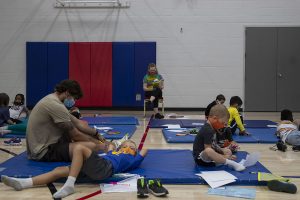University of Iowa professors balance health and learning with online lectures
Although classes with less than 50 students do not have to go online, some professors have chosen to do so anyway in the interest of their student’s health.
The Old Capitol is seen on Thursday, March 12, 2020.
September 20, 2020
Although the University of Iowa moved 75 percent of classes online, professors also have a certain amount of authority to determine the most appropriate way to teach their class.
Even when not explicitly mandated to do so, several UI professors have chosen to move their classes online for a variety of reasons.
Associate Professor in the Department of Anthropology Theodore Powers, who currently teaches Introduction to Global Health Studies, said he moved his class’s discussion section online in the third week of school after cases began to spike in Johnson County.
“[There was] kind of an exponential increase of caseload and infection… that put everyone in a situation where they were at a higher risk of exposure to COVID-19,” Powers said. “As a result…I thought it was prudent to shift the course to an all online modality for lecture and discussion sections.”
Associate Professor in the School of Journalism and Mass Communication Rachel Young said she started Media Uses and Effects with online lectures but in-person discussion sections. She said the decision to move fully online was both prudent and practical.
RELATED: UI science students adapt to online classes, loss of in-person labs
“We had a pretty large proportion of students who were quarantining and wouldn’t have been
able to come to an in-person class,” Young said.
Associate Professor in the College of Public Health, Carri Casteel, who teaches Occupational Health, said she sent an anonymous survey to her students and found that half of the students preferred going online. She said students can either choose to take the class online or attend in-person lectures.
“I wasn’t sure how comfortable my students in Occupational Health would be coming in person to class,” Casteel said. “So, I decided early on to do the first class in person, and then go online unless I heard differently from the students.”
Casteel said she was not surprised that almost a third of her class wanted to stay in person, acknowledging that she does have some concerns about online learning, which has led her to modify her course.
RELATED:280 UI instructors advocate for online classes, pledge to teach online-only instruction
“I think it’s a little harder to ask questions and to engage and I expect that might have some implications for student learning and for grades, which is why I’ve incorporated a lot more of these class exercises, so that there is some kind of a better understanding of my expectations for exams,” Casteel said.
Young said technology can also be a barrier for online learning, as well.
“We did have one student who said that they…didn’t feel their computer would be reliable enough,” Young said. “We tried to help connect them with places on campus [where] you can still use a computer in a common space.”
Powers said it is hard to tell how these changes will affect student learning this semester, but he knows everyone is trying to do the best they can. Cautioning people away from playing the “blame game,” he said the community needs to work together to fight the pandemic.
“I know that everyone wants to look at those pictures of students at the bar and say, ‘well, that’s what caused it’, but that’s like a small minority of students in our community,” Powers said. “People aren’t going to test if they’re going to be vilified. They’re not going to self-report if they’re going to be vilified. And then we’ve lost our best tool – contact tracing. People need to think about how they can work together and not fight one another.”






